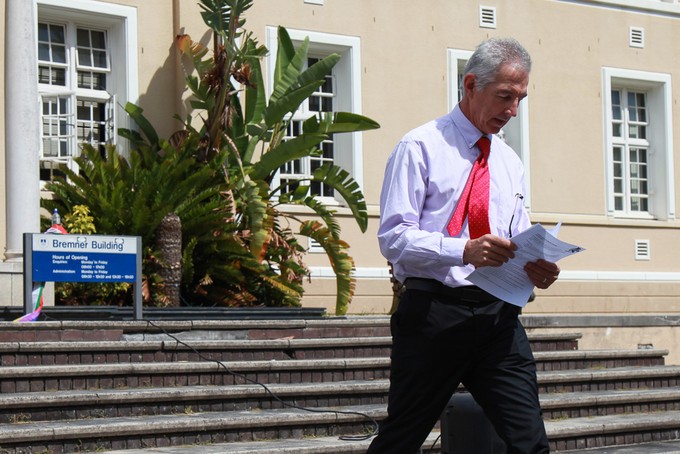
UCT vice-chancellor Max Price has proposed a new fees policy for the university. Photo: Ashraf Hendricks
29 August 2016
UCT has proposed that only students from households earning more than a threshold amount — R500,000 per year is suggested — should pay a fee increase.
Vice-chancellor Max Price sent an email to all students, staff and alumni last night that sets out the institution’s position.
Price wrote that an 8% increase is needed to balance UCT’s books. He said this is about two percentage points above inflation because of factors such as the increased cost of insourcing outsourced staff, and because the university imports a number of purchases such as library subscriptions and electronics.
The price of these has increased substantially over the past year because of the depreciation of the rand.
Price pointed out that the president’s commission on fees under Judge Heher is looking at a long-term policy and will not be complete before mid-2017. In the meanwhile the shortfalls for 2017 and 2018 need to be covered. Price gave a number of reasons why it is unlikely that the state will cover that shortfall, although he believes “ideally, government should fund the full shortfall and fees should be kept at their current level”. Price does however point out that even with wealthier students subsidising lower-income ones, the state would still have to make up a shortfall, albeit a smaller one. (Read UCT’s submission to the Fees Commission.)
UCT has a “gap” funding mechanism to support students in the “missing middle”: those who do not qualify for the state’s National Student Financial Aid Scheme but who cannot afford fees.
It is not clear in Price’s email when UCT intends to implement the new policy, and what the precise fee increase would be for higher-earning households - whether it would be 8% or more.
In an article published on GroundUp last year titled Fees should not fall for all, Nico Cloete of the Centre for Higher Education Trust argued for the kind of differentiated fee structure UCT has put forward. Some student activists, however, oppose this.
Meanwhile, a student boycott at Walter Sisulu University campuses continues. There have been violent clashes between students and police. Walter Sisulu University has few students from families with household incomes more than R500,000 per year, so while UCT’s proposal might work for the country’s leading universities, it remains unclear how the country’s poorer universities will deal with fee increases next year.
The first paragraph was rewritten after publication. It originally stated “UCT has proposed that only students from households earning more than R500,000 per year should pay a fee increase.”